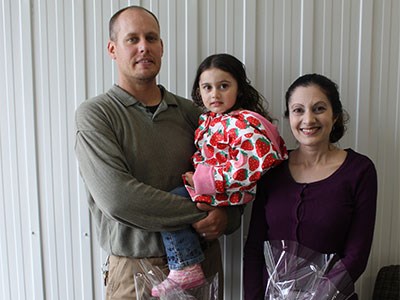On an old Finnish homestead that dates back 80 years, Greg and Mira Melien are establishing Northern Ontario’s first commercial winery.
Boreal Berry Farm and Winery in Warren is producing wine from the haskap berry, a hardy, cold-tolerant fruit of the honeysuckle family that resembles an elongated grape and tastes like a cross between a blueberry and raspberry.
With hints of dark berry, vanilla and licorice, the wine has been compared to a pinot noir.
Located 40 minutes east of Sudbury, the farm also grows a variety of fruit, including Saskatoon berries and cherries, and produces haskap wine jellies, jams and dessert toppers. The couple is also hoping to put in a juice-producing facility.
“We were just looking for the right farm and this was it,” Mira said. “We tested the soil and determined it was suitable for the fruits we wanted to grow, and they’re doing very well.”
Their target market is Toronto and Ottawa, and the Meliens primarily promote their wares at the Royal Winter Agricultural Fair and La Foire Gourmande. They also run the Ontario Haskap Association.
The proprietors don’t come from a farming background, but they had been experimenting with fruit wines as far back as 2005 when Greg was stationed in Petawawa.
Boreal Farm is organic, biodynamic and sustainable. No herbicides are used on the crops, and all the fruit is hand-weeded and hand-picked by the Meliens.
“The growing experience just came from trial and error over time,” Mira said. “We’ve taken some courses as well, just to learn about wine-making, and we also teach courses here.”
Situated along the Nepewassi River flood plain, the farm is the only one in the area with silt loam on it. The couple has cultivated 40 acres of tile-drained land, on which they’ve planted 7,500 haskap plants. This year they’ve added 400 grape plants to their orchard; if the plants overwinter well, they’ll add an additional 1,600 plants in the spring. Another 40 acres of land is currently used as pasture.
The farm is located in growing zone 3b, which is characterized by a short growing season and high potential for frost in late spring. But it also takes less time for fruit wine production. It takes roughly three months to produce a fruit wine, while traditional grape wines can take up to 18 months to produce.
Italian-made 2,000-litre tanks can produce up to 10,000 litres of wine, but the Meliens will make 3,000 litres to start.
With assistance from renowned Canadian fruit winemaker Dominic Rivard, this year the farm will produce haskap wine and cherry wine, as well as a garlic wine that is ideal for cooking.
Over the last year, the couple has been constructing the production building which will house their wine-making and bottling equipment, a small tasting area, a kitchen/laboratory area, and a cold cellar for storage.
A patio and outdoor café adjacent to the building will host tasting events where visitors can pair the wines with cheeses, crackers and fruit. Greg said visitors will be encouraged to bring a picnic, and the couple may consider opening a restaurant in the future.
“Eventually, this might become a bed and breakfast,” Greg said.
Constructed of insulated concrete foam, the building has an R52 rating and uses the natural night air to keep the products at the ideal temperature.
“What we’ve essentially created here is an above-ground cave,” Greg said. “Everything here is designed to be very insulated so we can keep the heating costs and cooling costs down.”
The operation runs on solar energy, and the Meliens are also growing switchgrass, which will be pelletized on site and used to heat the building in cooler temperatures.
In addition to harvesting fruit, the Meliens also keep a small herd of Canadienne cows, a cold-hardy heritage breed of which there are only a few hundred in Canada, and Chantecler chickens, also a cold- weather breed.
And the farm is certified bee-friendly, which means the Meliens make their farm attractive to wild pollinators by letting their field go to wildflower, and constructing wild pollination sites out of bundled raspberry canes, logs or mud buckets to keep bees on their site.
“It’s all part of keeping the orchard,” Mira said.




